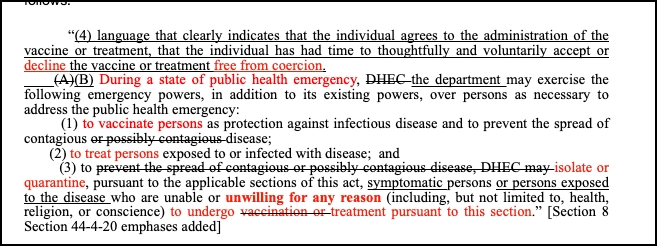Give us Informed Choice
In a nutshell, a preoccupation with “informed consent,” currently appearing in some proposed legislation in South Carolina, too often completely misses the point. Yes, it is reasonable to help people understand and have relevant prior knowledge of what any medical procedure could entail. However, if only “informed consent” is provided, is that enough?
What is the point of informed consent, if one can’t accept or refuse any procedure after being “informed”—without punishment or being forced to comply anyway? The logical corollary to “informed consent” must the the freedom to make an “informed” decision based on information provided by “informed consent”—a decision that will not be revoked without regard to the preferred choice of the individual impacted. Whether or not all individuals have the freedom of choice regarding whether or not to do anything that changes their body IS what matters. Every adult should have a choice about whether to consume, have injected, snort, topically apply or otherwise allow any substance to enter their unique bio-system, be it food, drink, medicine, drugs or anything else. Parents should be able to make these decisions for their own children. Some debate may be reasonable over cautions or control of specific substances that are clearly toxic or life-threatening, but preference must always be toward individual choice, responsibility, and acceptance of consequences.
In today’s world, particularly as we see the extent of State control of information and the rise of AI as the future source of all knowledge, human beings must be allowed to also consider, at the least, their own intuition, a wide scope of information from all sides of any issue, and their own world-view, as they determine how to protect their own safety and survival. Each adult, relying on God and/or their innate common sense, as opposed to dictates of the State, should be empowered to make the kinds of decisions regarding bodily autonomy now encountered in today’s world, particularly as we battle with nefarious forces that may be undermining individual safety and responsibility for many reasons.
Informed consent may be looked at from at least two perspectives. The first, and most obvious, is informed consent specifically relating to characteristics of any drug, vaccine, or other medical intervention that is proposed. While one might expect, and would certainly hope, that only complete, unbiased, proven, and honest information about all aspects of any “vaccine” or drug, especially new ones, would be provided to a consumer, it has become clear that this is too often not the case. Therefore individuals must be allowed to research and rely on alternative sources for information in order to take personal responsibility for their “informed” choice and for full understanding of the consequences of any medical procedure.
A second type of “informed consent,” one that is often disguised or overlooked in proposals for new law, covers the non-medical consequences that may be employed if the medical procedure is refused. One aspect of this type of “informed consent,” is that such consequences are generally designed to discourage refusal of any State recommended action. Unfortunately refusal may carry penalties that are undesirable to many people—and should never be compulsory in a free society. Disclosure of these consequences may be deliberately withheld to require compliance with some proposed bills presented to the current South Carolina legislature. More on that follows.
Two active bills that infringe on freedom of choice and increase the power of the State to determine the “health and well-being” of the people under State control are S343 and S54. Given realities of the legislative process, it is literally critical to the survival of millions of people that each individual be free to choose. Individual acceptance or rejection of any life-altering course of action must be allowed without punitive actions or unreasonable threats. Consequences carried out in the past (or even now) included loss of employment, compliance for school attendance, and limits on access to essential items. We have all seen or experienced terrible outcomes with forced vaccines, draconian quarantines, ridiculous social controls, masks, economic disruption, and even worse consequences, including permanent damage and even death from dangerous injections.
S343 was proposed to require “informed consent.” However, that bill completely omits the critical reason for “informed consent,” i.e. the presentation of sufficient information so that an individual could choose to accept or refuse the action proposed. Why bother to give people information if they cannot use it to determine their own course of action—which must include saying, “NO!” without punishment. The whole fiasco becomes an exercise in psychological manipulation and insulting condescension by our government, which already goes too far to coerce us. S343 sounds like some kind of prop to be used by the State for its own purposes if or when desired. The text of S343 is available at the end of this article for the reader’s entertainment.
A second, and far more dangerous, bill is S54. “Informed consent” is defined and required. What consequences, however, are not revealed during the “informed consent” process? One example might be that, after receiving the “informed consent,” if someone refuses a vaccine, that person may be included on a list of “unvaccinated” persons—who can then be easily identified and rounded up as desired by the State. Should this be a concern? It is to this author. Please read this bill. Within S54 it is not hard to find reasons for grave concern about giving the State this kind of power.
Fortunately S54 has been amended to include language that uses the word “decline” (see excerpt below). However, subsequent language raises some red flags about the consequences of refusing all vaccines. Further amendments could also remove or jeopardize this one word. Could an “emergency” override the phrase, “free from coercion?” What else would these “emergency powers” be other than “coercion.” It should be hard to feel comfortable with giving such power to the State and the courts. Further examination of S54 can be found in the blog on the Conservatruth website. One pertinent excerpt reads as follows:

“(4) language that clearly indicates that the individual agrees to the administration of the vaccine or treatment, that the individual has had time to thoughtfully and voluntarily accept or decline the vaccine or treatment free from coercion.
(A)(B) During a state of public health emergency, DHEC the department may exercise the following emergency powers, in addition to its existing powers, over persons as necessary to address the public health emergency:
(1) to vaccinate persons as protection against infectious disease and to prevent the spread of contagious or possibly contagious disease;
(2) to treat persons exposed to or infected with disease; and
(3) to prevent the spread of contagious or possibly contagious disease, DHEC may isolate or quarantine, pursuant to the applicable sections of this act, symptomatic persons or persons exposed to the disease who are unable or unwilling for any reason (including, but not limited to, health, religion, or conscience) to undergo vaccination or treatment pursuant to this section.” [Section 8 Section 44-4-20 emphases added]
The strike out of “vaccination” may not eliminate the danger of being forcibly injected and does not protect one from brutal conditions as outlined elsewhere in this bill and which could be interpreted as coercive. Number (1) seems pretty straightforward if taken alone. Would (3) override it or be subject to interpretation or panicked action during a declared emergency? Perhaps the injection will be labeled as something else—like a “treatment.” Or could the strike-out be ignored (if adopted the law will not contain the stricken text) leaving the person who then receives this “treatment” or injection with only recourse to the courts, as also covered in this legislation, but likely not in time to avoid undesirable consequences which, under this law, could include arrest? State power and potential abuse should not be dismissed as fear-mongering in such a dire situation which may include an induced state of panic and hasty actions.
A common phrase used in many drug programs has been, “Just say, ‘No.’” That phrase must be allowed and used without restrictions today in this world of lies, psychological warfare, and emotional manipulation, which are all used so effectively to condition, threaten, and sometimes terrorize people into complying with unwise State mandates.
To save our country and society, people must stop this insane belief that all things should appear in law—for our own good. Our government must allow for individual choice, especially in matters of life and death. More laws will only result in more State power, rigid consistency in permissible information, thinking, words and activities, and forced compliance. Laws will not protect our freedom. When it comes to matters of “informed consent” the people need to be assured of complete and final control of their own decisions. Our legislators simply must stop giving the State the platforms it wants and needs to grow its absolute power.
And “We the People” must let them know that they must do what it right and just.
A bill
TO AMEND THE SOUTH CAROLINA CODE OF LAWS BY ADDING SECTION 44‑29‑175 SO AS TO ESTABLISH AN INFORMED CONSENT PROTOCOL THAT MUST BE FOLLOWED PRIOR TO A CERTAIN COVID‑19 VACCINE BEING ADMINISTERED OR RECEIVED.
Be it enacted by the General Assembly of the State of South Carolina:
SECTION 1. Chapter 29, Title 44 of the S.C. Code is amended by adding:
Section 44‑29‑175. (A) Prior to administering the Pfizer‑BioNTech COVID‑19 vaccination, the person administering the vaccine must verbally notify the person receiving the vaccine that the vaccine is a new vaccine, that the vaccine is contaminated by the presence of fragments of bacterial plasmid DNA encapsulated in a lipid nanoparticle delivery vehicle, and that the long‑term safety of the vaccine is unknown.
(B) The person to whom the vaccine will be administered must, prior to receiving the vaccine, sign and date a written notice that states that the vaccine is a new vaccine, the vaccine is contaminated by the presence of fragments of bacterial plasmid DNA encapsulated in a lipid nanoparticle delivery vehicle, and the long‑term safety of the vaccine is unknown.
SECTION 2. This act takes effect upon approval by the Governor.
XX
Disclaimer: The views expressed in this article are those of the author and do not constitute legal or professional advice. ConservaTruth assumes no liability for any actions taken based on this content. Read more.

Subscribe to ConservaTruth's Email Newsletter for curated insights on South Carolina's legislative activities and conservative viewpoints, delivered straight to your inbox! With vetted and easy-to-understand information, our newsletter empowers you to become an informed and engaged citizen, actively participating in safeguarding our cherished Constitutional values. Don’t miss out on crucial updates—join our community of informed conservatives today!





Comments